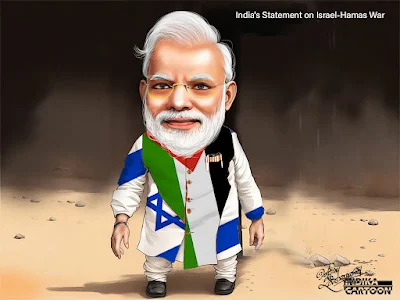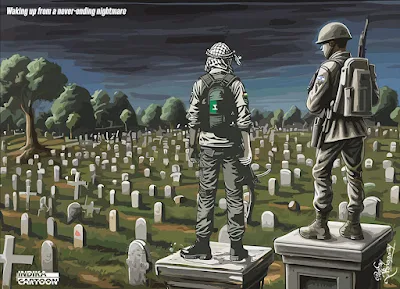Art and philosophy are two distinct yet interconnected fields that explore fundamental aspects of human existence and the world around us.
Saturday, March 30, 2024
"Exploiting Faith and Prejudice: The Dangerous Game of Political Manipulation"
Wednesday, March 27, 2024
"Ethics and Power: Navigating the Complexities of Political Behavior" (political cartoons)
It's a common perception that some politicians might engage in unethical or morally questionable behavior to maintain or gain power. This can include actions such as corruption, manipulation of electoral processes, exploitation of societal divisions, or disregarding democratic norms.
However, it's important to recognize that not all politicians engage in such behavior, and sweeping generalizations can be unfair. Many politicians enter public service with genuine intentions to make positive changes in society and uphold the principles of democracy.
Furthermore, the extent to which politicians can get away with unethical behavior often depends on the robustness of a country's institutions, the vigilance of its citizens, and the strength of its legal and regulatory frameworks. Strong democratic institutions, a free press, an independent judiciary, and an engaged civil society are crucial in holding politicians accountable and preventing abuses of power.
While instances of politicians behaving unethically or abusing power certainly occur, it's essential to maintain a
Tuesday, February 27, 2024
Politicians oppress people as a means of survival
Policy Pressure:
Politicians may use their power to implement policies that put pressure on certain groups or individuals. This could be through taxation policies, regulatory measures, or changes in legislation that affect specific demographics.
Rhetorical Pressure:
Politicians may employ rhetoric that pressures people to conform to certain beliefs or behaviors. This could involve using fear tactics, exaggerations, or misleading information to manipulate public opinion and coerce compliance.
Social Pressure:
Politicians often wield significant social influence, and they may use their platforms to pressure individuals or groups into supporting their agenda. This can involve rallying supporters, demonizing opponents, or ostracizing dissenters.
Economic Pressure:
Politicians may leverage economic power to exert pressure on individuals or businesses. This could involve offering incentives for compliance, threatening punitive measures for non-compliance, or manipulating economic conditions to achieve desired outcomes.
Legal Pressure:
Politicians may utilize the legal system to exert pressure on individuals or organizations. This could involve initiating investigations, filing lawsuits, or passing laws that target specific groups or behaviors.
Media Pressure:
Politicians often have relationships with media outlets and may use them to apply pressure on people indirectly. This could involve controlling the narrative, shaping public discourse, or influencing public opinion through selective dissemination of information.
Overall, the ways in which politicians put pressure on people can vary widely depending on their goals, the political context, and the tools at their disposal. While some forms of pressure may be legitimate and necessary for governance, others can be manipulative or oppressive, undermining democratic principles and individual freedoms.
To what extent can politics put pressure on the media?
Politics can exert significant pressure on the media, impacting its ability to operate independently and fulfill its role as a watchdog and provider of unbiased information. This pressure can manifest in several ways:
Ownership and Control:
Politically affiliated individuals or entities may own or control media organizations, influencing the editorial direction and content produced. This can lead to biased reporting or suppression of information that is unfavorable to those in power.
Advertising Revenue:
Media outlets often rely on advertising revenue to sustain their operations. Politicians or political parties may use their control over advertising budgets to reward favorable coverage or punish critical reporting. Additionally, businesses may withhold advertising dollars from media outlets that publish unfavorable stories about them or their allies.
Access to Information:
Politicians have control over access to information, including press conferences, official statements, and government data. They may restrict access to journalists who are critical of their administration or provide preferential treatment to those who toe the party line.
Legal and Regulatory Pressure:
Governments can pass laws and regulations that directly or indirectly constrain media freedom. This could include defamation laws used to silence criticism, licensing requirements that restrict the number of media outlets, or regulations that limit foreign ownership of media companies.
Intimidation and Harassment:
Politicians or their supporters may intimidate journalists through threats, harassment, or legal action. This can create a chilling effect, discouraging reporters from investigating sensitive topics or holding those in power accountable.
Propaganda and Disinformation:
Politicians may disseminate propaganda or disinformation through state-controlled media or by manipulating social media platforms. This can confuse the public and undermine trust in independent journalism.
Cooptation:
In some cases, politicians may coopt journalists by offering them access, favors, or exclusive information in exchange for favorable coverage. This can compromise journalistic integrity and undermine the media's role as a watchdog.
Overall, the extent to which politics can put pressure on the media depends on factors such as the level of press freedom, the strength of democratic institutions, and the willingness of journalists to resist undue influence. Maintaining a free and independent media is essential for democracy, as it ensures that citizens have access to accurate information and can hold their leaders accountable.
Thursday, November 16, 2023
Political jokes and thieves' jokes amid Sri Lanka Cricket's membership ban.
The International Cricket Council has suspended the membership of Sri Lanka Cricket with immediate effect.
The International Cricket Council issued a statement saying that it should be confirmed that there is no government interference in the functioning, independence, and administration of Sri Lanka Cricket.
It is stated in the announcement issued by the council that further consideration of the related matters is expected to be done in the future.
The Board of Directors of the International Cricket Council has held a discussion regarding cricket in Sri Lanka through the online system, after which this decision has been taken.
The 'Cricinfo' website reports that this cricket ban was done at the request of Sri Lanka Cricket.
The Cricinfo website points out that Mr. Shammi Silva, who has already gone to India, has been made to participate in the committee meeting to take this decision.
It is further reported that he is going to participate in the upcoming ICC meeting to be held in Ahmedabad.
The Cricinfo website further points out that when an interim cricket committee was operational in Sri Lanka during 2014-2015, it was accepted by the International Cricket Council.
With the Sri Lankan cricket team continuously losing matches in the 2023 World Cup, Sports Minister Roshan Ranasinghe took steps to appoint an interim cricket control board chaired by former cricket captain Arjuna Ranatunga.
However, when the Chairman of the Cricket Institute took steps to file a case in the Court of Appeal against it, the Court of Appeal imposed an interim ban by suspending the interim governing body for 14 days.
Later, there was a heated discussion about this in the Parliament, and a debate was held regarding the removal of the board of officials including the Chairman of the Sri Lanka Cricket Institute and steps were taken to pass the joint plan in the Parliament.
Meanwhile, Sri Lanka Cricket has also decided to call the COPE committee on the 14th.
In such a background, the International Cricket Council has taken steps to suspend the membership of Sri Lanka Cricket with immediate effect.
Saturday, October 28, 2023
Squint your eyes - see more '--- ඇස් පුංචිකරලා බලන්න - see more
Thursday, October 19, 2023
We are listening to the jokes of corrupt political figures
Some comedians and satirists use humor to shed light on the dishonesty and deception that can occur in politics. Using humor may help the public become more aware of these issues and encourage them to be more critical and informed about political matters.
It's important to remember that while political humor can be entertaining, the underlying issues of deception and dishonesty in politics are serious and can have significant consequences for society. Therefore, citizens need to stay informed and engage in the political process to hold politicians accountable for their actions.
Monday, October 16, 2023
India's Statement on Israel-Hamas conflict (narendra modi )
India reiterates call for ‘sovereign, independent, viable state of Palestine’
India’s “longstanding and consistent” policy on the Palestinian state remains unchanged, says MEA spokesperson;
“Our policy in this regard has been long-standing and consistent. India has always advocated the resumption of direct negotiations towards establishing a sovereign, independent, and viable State of Palestine living within secure and recognized borders, side by side at peace with Israel,"
Sunday, October 15, 2023
Sketches of Struggle: Illustrating the Realities of War
Conflict Resolution: War can be seen as an extreme form of conflict resolution. When diplomatic, political, and peaceful means of resolving disputes fail, nations may resort to war to assert their interests or protect their values. In this context, war highlights the inadequacies of other conflict resolution methods and the need for better diplomacy and communication. - ???? - Watch the video
Thursday, October 12, 2023
Waking up from a never-ending nightmare (war cartoons)
Terrorism and war are both expressions of conflict, but they differ in scale and method. Terrorism represents asymmetrical warfare, a means for non-state actors to achieve political or ideological goals through fear, targeting civilians. War, on the other hand, involves organized, large-scale conflict between states or factions. Both share a common thread of suffering and devastation. Terrorism exemplifies the power of a few to disrupt the many, while war magnifies the consequences of international disputes. In understanding them, we grapple with the human capacity for violence and the necessity of diplomacy, highlighting the urgency of peace-building, justice, and addressing root causes.
Power and Politics: War often reveals the dynamics of power and politics on both national and international levels. It can be a means for states to establish dominance, protect their sovereignty, or pursue expansionist agendas. This exposes the complexities of geopolitics and the consequences of power imbalances.
Wednesday, August 9, 2023
Thursday, April 20, 2023
Why cartoons matter politically
They can communicate complex issues in a simple and accessible way: Cartoons can simplify complex political issues into an easy-to-understand format, which can help engage audiences who might not otherwise be interested in politics. For example, cartoons can use humor and satire to critique political leaders or policies, making them more approachable to a wider audience.
They can challenge authority and expose hypocrisy: Cartoons can be a powerful way to challenge authority and expose the hypocrisy of those in power. They can be used to critique political leaders or institutions and hold them accountable for their actions.
They can inspire activism and change: Cartoons can be a powerful tool for inspiring activism and change. They can raise awareness about important issues and mobilize people to take action. Cartoons can also be used to encourage people to vote or participate in political movements.
They can serve as a form of protest: Cartoons can be a way for people to express dissent and protest against political leaders or policies. They can be used to amplify the voices of marginalized communities and challenge the status quo.
Overall, cartoons matter politically because they have the ability to engage, educate, and inspire audiences in ways that other forms of media cannot. They can serve as a powerful tool for social and political change.
Monday, April 10, 2023
Tuesday, October 11, 2022
Saturday, September 22, 2018
AD
Roma art
Featured Post
"The Price of Experience: Commodification in a Consumer-Driven Society"
In a consumer-driven world, many aspects of human experience—relationships, emotions, and even identity—can be commodified. This commodific...
.jpeg)
-
It's a common perception that some politicians might engage in unethical or morally questionable behavior to maintain or gain power. Thi...
-
The quote is attributed to Khalil Gibran, a Lebanese-American writer, poet, and philosopher known for his profound insights into human natur...
-
Prometheus is a complex character in Greek mythology, embodying various themes and ideas that have fascinated storytellers, philosophers, a...









.jpg)


.png)















